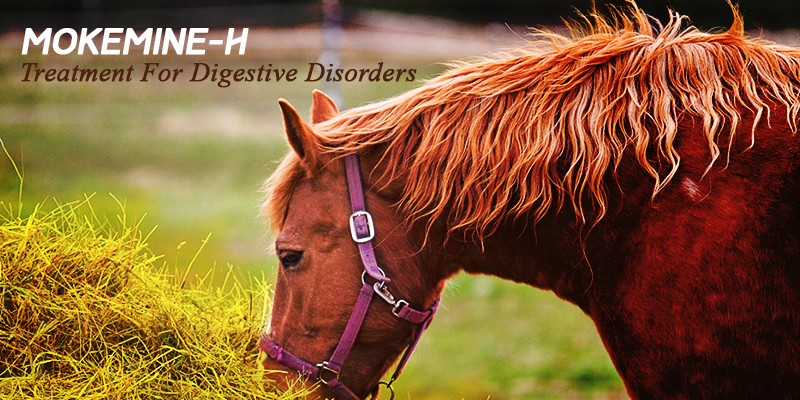Just like us, our horses too suffer from the ignominy of digestive problems and the trouble they bring. And just like us, the digestion begins as soon as your pet starts chewing food and saliva gets into action. The enzymes get into action, and the entire process continues with swallowing, the breakdown of food, absorption assimilation and yes throwing out of waste.
Digestion is essential not only regarding providing nutrients but also for maintaining the proper balance of fluid and electrolytes in the body.
If your horse has a digestive problem, you must first be able to identify it correctly and to do that you must know the signs and symptoms of various digestive problems.
General signs of digestive disorders in horses include:
- Excessive drooling
- Constipation
- Diarrhea
- Loss of appetite
- Bleeding
- Abdominal pain
- Bloating
- Shock
- Dehydration
Horses cannot vomit or regurgitate
Diarrhea: often a sign of digestive disorder and can be brought on by various reasons
Large-volume watery diarrhea usually associated with hypersecretion (when excess fluid is secreted into the intestines) Can be due to bacterial infection.
Diarrhea can also be brought on by malabsorption due to a defect in intestinal cells responsible for absorption. Can be caused by a viral infection
Colic: One of the most common digestive disorders in horses, leads to immense pain and the horse may tell you by pawing the ground repeatedly, kicking at the abdomen, rolling on the ground.
The horse might also sweat intensely, distended or swollen abdomen and be straining to defecate.
Infectious diseases:
Just like humans, horses also have small numbers of specific intestinal microorganisms within the digestive tracts and most commonly in the intestines. These are beneficial for digestion, but certain times these organisms can multiply suddenly due to infections. This can also happen due to stress, unhygienic conditions or if the immune system of the animal is compromised.
Parasites are the most common causes of digestive tract disorders in horses. Parasites can cause severe disease or merely decrease your horse’s overall fitness. Some of these parasites also infect humans. Because parasite infection is easily confused with other illnesses, diagnosis depends on the veterinarian’s knowledge of seasonal cycles of parasite infection, as well as an examination of feces for evidence of parasite eggs or larvae. In some cases, blood tests can also be used to detect the presence of parasites.
Noninfectious diseases: These can be brought on by
- Overeating
- Poor quality of food
- Chemicals obstruction
- Swallowing foreign objects
- Injury to the digestive system
- Enzyme deficiency
- Damage to gastric tract(ulcers)
Treatment of digestive disorders in horses
The first and foremost step is a correct diagnosis for this you must provide the complete history and detailed symptoms.
Your vet might carry out stool and blood test to make the right prognosis.
You must also take the following steps:
- Eliminate the cause of the problem
- Replenish fluids lost during diarrhea
- Relief from distention
- Relief from pain
To ensure that your horse does not have to face frequent bouts of digestive problems make Mokemine-H a part of your horse’s diet.
Mokemine-H from Bagdara farms has been curated keeping in mind your horse’s digestive system hence it is the perfect solution to all digestive system disorders in horses.
Mokemine-H works because:
- Mokemine-H is rich in curcumin and is 100% organic
- Curcumin in Mokemine-H is known for its anti-inflammatory and antibacterial properties and hence is most effective in fighting all forms of bacteria and checking inflammation.
- The anti-bacterial properties of Curcumin are also effective in providing relief from gastric problems and also ensuring that the digestive tract lining stays strong to fight any attacks from bacteria and also inhibits inflammation of the intestinal lining and wall.
- Essential oils and Curcumin present in Turmeric have unique gastroprotective property. Mokemine-H is the best option to treat digestive disorders without any side effects.
- Curcumin in Mokemine-H regulates the immune system thus preventing stomach disorders and also strengthening the immunity system.
- Curcumin in Mokemine-H brings down intestinal motility dysfunction.
- Varying degree of contractions of the intestinal wall can lead to diarrhea or constipation.
- Curcumin in Mokemine-H can also check and control the other symptoms. The response of the immune system leads to sensitivity in the gastrointestinal tract. If one were to eliminate all the food items one is allergic to it would lead to reduced intake of nutrients which is certainly not a feasible option.
- Mokemine-H has very high curcumin content which is the best natural anti-viral and anti-bacterial
- Curcumin in Mokemine-H provides instant relief from painful cramps during diarrhea.
Order Mokemine-H now and offer relief to digestive disorders in horses now!
